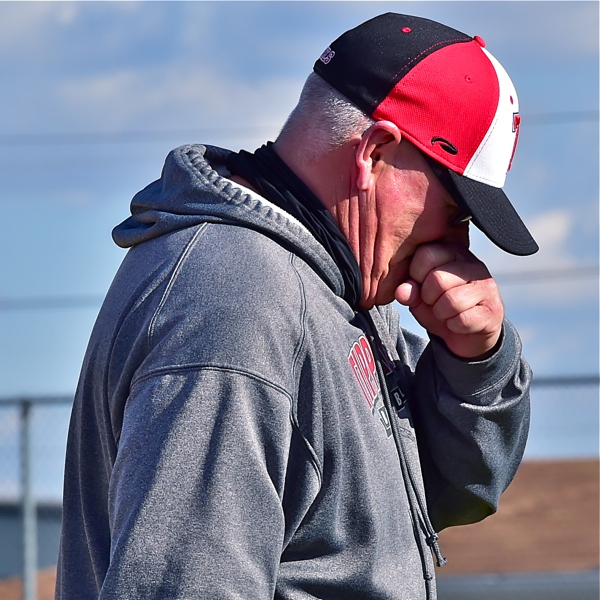
“The argument is that travel baseball provides better competition. But baseball is a game of execution, regardless of the level of competition.” – Former Tipp coach, Bruce Cahill
As summer wanes and seasons shift, so, too, does community attention to the more popular, and profitable, high school sports that seem to carry on in perpetuity…as the boys of summer, and baseball, get in their final swings hoping for that same perpetuity to come next spring.
 Coming home from Huntington, recently, I was driving north on state route 23 when I passed through Lucasville, Ohio, and noticed four youngsters at a community park playing baseball.
Coming home from Huntington, recently, I was driving north on state route 23 when I passed through Lucasville, Ohio, and noticed four youngsters at a community park playing baseball.
Unusual, given the date, August 3, and the first week of fall football practice.

Get locals scores first every Friday night…on the Press Pros’ Wilson Minute-To-Minute Scoreboard.
I decided to stop for gas at the local Speedway store, and when I was finished I turned into the park to more closely watch – one throwing batting practice in afternoon humidity that would take your breath away, while another took his turn hitting. The other two, in shorts, and shirtless, chased down the batted balls. The thought struck me that what I was watching was an ironic metaphor to sports activity in almost every county of Ohio. This was football season. And the four could well have played, I’m sure, for any of the local schools in Scioto County.
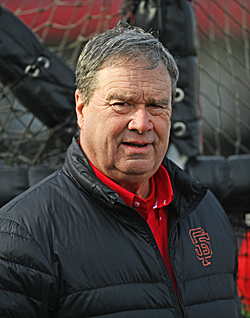
Publisher/Editor Sonny Fulks writes OHSAA and Big Ten baseball for Press Pros Magazine.
“No, we don’t play football,” said one that I asked, as they collectively gathered up the baseballs. “Our friends do, but we just play baseball.”
I couldn’t help appreciate another obvious irony. That while all of Ohio waited with anticipation for football to start, I was probably the only one who even noticed that four teenage boys were playing ‘unorganized’ baseball on a steamy, summer afternoon, just because they liked it.
The image stuck with me, and because baseball numbers continue to dwindle in many communities, I recently contacted four iconic names in high school coaching to talk about the issue of why more boys aren’t playing baseball, or why they’re not playing past the eighth grade…to ask their opinion about the future of amateur/community baseball.
Tom Randall coached 35 years at Northeastern and Kenton Ridge High School, in Clark County, and won more than 500 games.
Chris Hardman has won 700 high school baseball games as the coach at Ottawa Hill High School, in suburban Toledo.
Mark Brunswick is the current coach and athletic director at Lehman High School, with 500-plus career wins with Bellefontaine and Marysville, and a member of the Miami Valley Coaches Association hall of fame.
And Bruce Cahill, recently retired as the coach at Tipp City, with 700 career wins and the patience of Job to spend 36 years fighting the trends that have suddenly and inexplicably threatened the age-old relationship between boys and baseball.
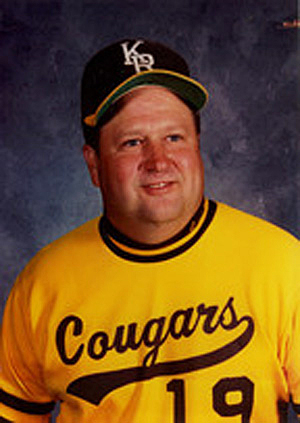
Hall of fame coach Tom Randall won more than 500 games in 30 years as the head coach at Kenton Ridge High School. He had four players ascend to the big leagues!
“It isn’t the same as it was when I was coaching at Northeastern and Kenton Ridge,” said Randall this past week, who with the others agreed to meet and just talk baseball. “There are a lot of reasons, but certainly I’ve never been a fan of travel baseball, over the community baseball that we had when I was a younger in coaching. Kids stayed together in the summer, played together and developed team relationships that just don’t exist in today’s baseball.
“I question parents, who’ve turned summer baseball into an opportunity to travel on the weekends, be in Cleveland one week and Indianapolis the next, without concern for who’s teaching baseball and what they’re teaching. Certainly, they’re not learning enough fundamental baseball, or it’s not being taught like we used to teach it, when kids stayed together, learned from each other in Little League, Babe Ruth, Knothole and on through high school. That’s all missing now in modern amateur baseball.”
“I’ve coached some 8, 9 and 10-year-old travel kids,” added Cahill. “And what I found was they want to play above their ability, against older kids with more advanced skills, where you couldn’t teach about how to field a sac bunt and throw out the runner at first base. The older kids who got on base stole second and third before you got a chance to teach and execute fundamental baseball. They watch baseball on TV and they try to do more than they can. It was very frustrating.”
Ask fifty coaches, or former coaches, about what’s wrong with current amateur baseball – the lack of participation, lack of skills, and lack of unity within the community over how baseball should be taught, and played – and you’ll get 50 different reasons, or at least 50 variations on a few.
“There’s no question that kids have more options for entertaining themselves now,” Cahill, Randall, and Mark Brunswick all agree.
And there’s no question among most that select baseball is now about the development of the individual, instead of the development of the group. A retired coach along the Ohio River simply calls it, “…an investment in ‘select’ selfishness. And they still throw to the wrong base.”
“The one thing I think that’s missing most is the time they spend together as a team, learning the game, learning from each other, and to trust each other as teammates,” says Brunswick. “That’s something my dad (Coldwater’s Lou Brunswick) stressed when he brought ACME baseball to Coldwater fifty years ago. “He thought it was important for kids to have an activity that kept them together, kept them learning new skills, and kept them in a competitive environment.”
“I think the state of high school baseball is actually pretty good,” said Piqua native Chris Hardman, whose Ottawa Hills team advanced to the OHSAA state semi-final game this spring before losing to Division III Waynedale. Hardman and I were teammates at Piqua in the late 60s, playing for his dad, Jim.
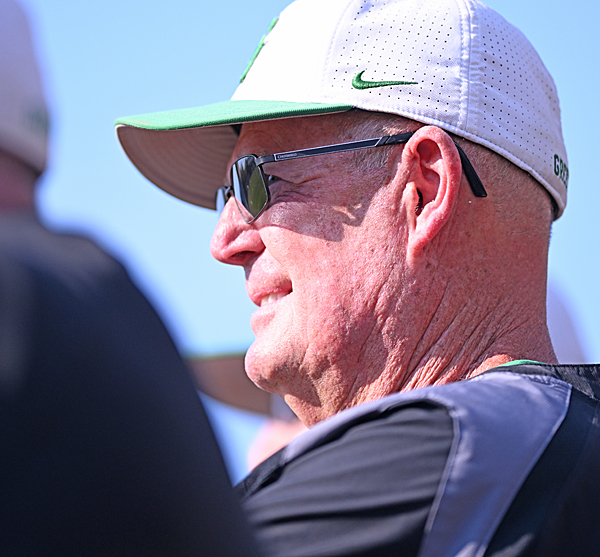
“Travel baseball has changed the landscape of high school baseball. We had kids who couldn’t play travel ball, but not enough left for ACME…and not enough time left for practice.” – Ottawa Hills coach Chris Hardman
“However, travel baseball has changed the landscape, and what high school coaches can now do with their teams. There’s good and bad, of course. The good is a better level of competition, I guess. The bad is a financial burden put on parents, the lack of practice time, and lack of availability to their high school coach. Our problem this summer was we had kids who couldn’t play travel ball, or weren’t asked, but there weren’t enough to have an ACME team. And while I do attempt to practice with them once a week, or ask them to help out with our youth camps, there simply isn’t enough time left for teaching the game.”
But Hardman’s situation at Ottawa Hills is a far cry from that of smaller districts in rural parts of the state, where in one case a mere eleven kids showed up this past spring to play baseball.
“If you want to play high school baseball you have to play travel ball in the summer,” a friend from Lawrence County shared with me in July. “And kids who can’t afford to play travel ball, or aren’t asked, get discouraged, and give up on playing baseball.”
An assistant coach reported that baseball had become so small a priority that there were only two bats and two helmets available this spring.
“And rarely does anyone show up to watch a baseball game,” he added. ‘”It’s cold, and the games start before anyone gets off work. It’s not like Friday night lights for football. There’s not much attention paid to baseball like it used to be.”
“Think about this,” a Pittsburgh Pirates scout told me last spring during the Big Ten season. “If a kid doesn’t play high school baseball there’s not much chance that his son will someday play, either. And then his son’s son isn’t going to play. What kind of picture does that paint for the future of amateur baseball that we know now?”
“The argument is that travel baseball provides better competition,” says Cahill. “But baseball is a game of execution, regardless of the level of competition. If you can learn to throw the curveball for a strike you can get people out at any level.”
“I coached at Kenton Ridge for 30 years and our kids were always together there in the summer,” adds Randall. “Now today I ask parents how come kids aren’t playing locally in the summer and they tell me that the competition isn’t good enough. But I had good athletes back then, and four of them went on to play in the Major Leagues, so I disagree with that. Those four guys all played right there at Northridge and Prosser Fields (Rick White, Dave Burba, Dustin Hermanson, and Adam Eaton).”
And the unilateral argument for revival of interest in community baseball, regardless of how many coaches you ask…is patience, and commitment.
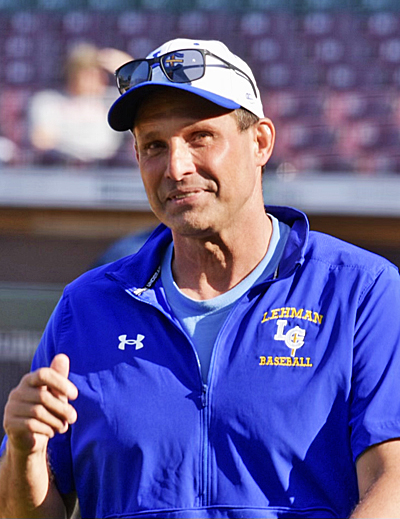
It takes patience…”My dad would stand out there for hours teaching kids the grip for the curve, or how to field a ground ball.” – Lehman baseball coach, Mark Brunswick
When Jim Hardman was winning 552 games as coach at Piqua he spent four hours a day every summer running a free baseball school for any kid who wanted to come out and sample what the game had to offer. He used to tell them: “Learn to love the game, and if you’re lucky the game will love you back, forever.”
And of course his son Chris has followed in his footsteps as closely as is humanly possible
Troy’s Frosty Brown has devoted more than a half century to teaching the game, while personally financing American Legion baseball through constant fund-raising for kids in Miami County.
And Rick Gold, who followed Hardman at Piqua High School, has fifty years of his own devoted to coaching the sport.
“Like anything else, it takes a patience to teach,” adds Gold. “But once a kid learns that someone is taking a personal interest in helping them develop, they tend to stick with it. That’s why patience in teaching anything is so important.”
“It’s how my dad coached at Coldwater,” says Brunswick. “He would stand out there for hours teaching kids the grip for the curveball, or how to field a ground ball. He made it personal for them. He was always very patient, and that’s something I’ve tried to copy from his example.”
Like Jim Hardman, Bruce Cahill had his own list of reasons for loving the game that he still carries on his phone: the joy of accomplishment…for the joy of belonging to a group…for teammates who cheer for you to do your best…for the challenge of working hard and being rewarded…love the game because you belong to a long line of fine athletes who have loved it and had it become their legacy…and love it because you might just pass it on to someone else.
Someone who just might throw batting practice for you on a field in Lucasville, while two others shagged baseballs…and no one was there to watch!



